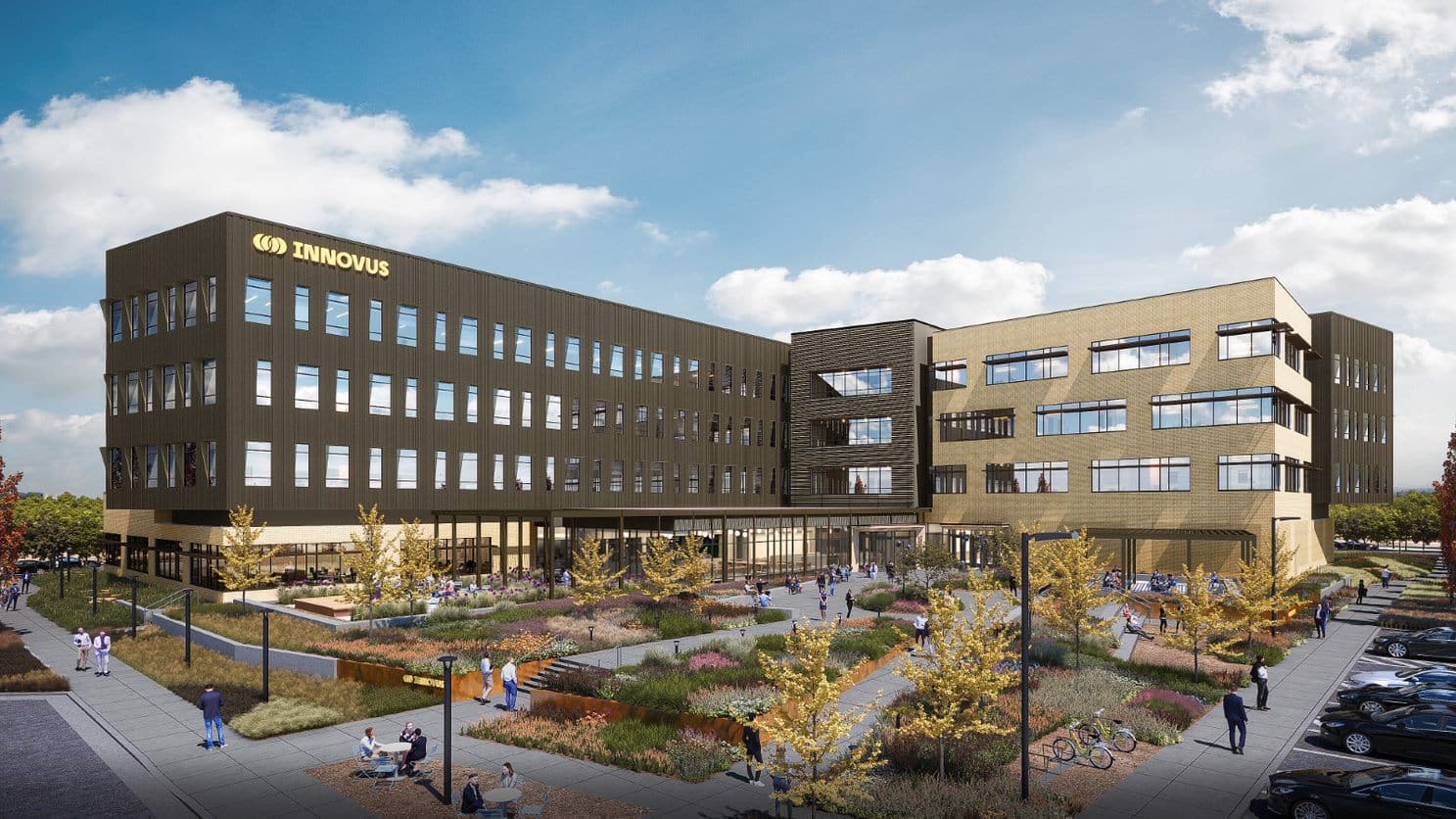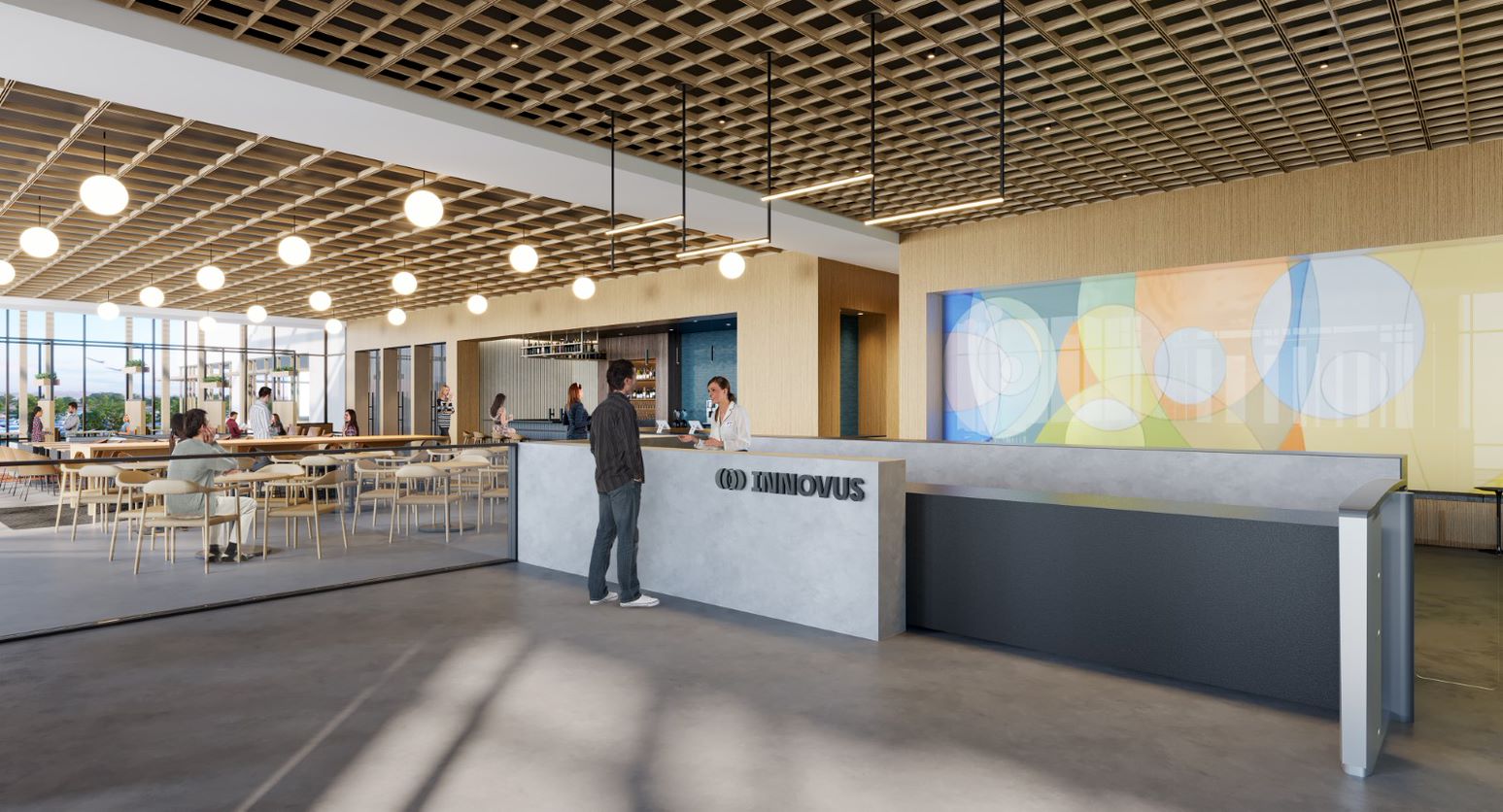
A rendering of the Innovus office building planned in Aurora. (Courtesy Koelbel & Co.)
Koelbel & Company wants to apply the Catalyst mindset to a new sector.
The Denver-based development firm once again is planning an office building targeting a specific industry — this time in Aurora, and aimed at government intelligence and defense contractors.
The company hopes to break ground in the fourth quarter on Innovus, a four-story, 200,000-square-foot building at the southwest corner of 6th Avenue and Valdai Street, not far from the Buckley Space Force Base.
Koelbel’s Catalyst office project at 3513 Brighton Blvd. in RiNo was completed in 2018 and marketed specifically to tenants in the health tech industry.

Carl Koelbel
Carl Koelbel, chief operating officer of the family-owned company, said there’s a natural link between the health care and defense industries.
“The industry itself has a mission,” he said. “If you look at the defense industry as a whole, there’s a mission there, there’s a focus there, that is broader than the individual company’s missions. Health care is a very similar thing. It was a really natural progression for us.”
Koelbel is developing the building in the mixed-use Aurora One project in partnership with DeNovo Solutions, which works with contractors. Founder Danny Moore, a U.S. Navy veteran, said he’s been thinking about the idea for a decade and approached Koelbel with it during a tour of Catalyst.
“I don’t know that a facility like this exists anywhere,” Moore said.
The uniqueness revolves around what Koelbel said is the firms’ novel approach to a challenge defense contractors face when it comes to their offices. Because employees often have security clearances, and work with classified information, their physical space must be accredited as secure by government standards.
Right now, companies are generally responsible for building out their space so it’s secure — creating “another box within a box,” Koelbel said. That’s costly.

Danny Moore
Smaller firms sometimes develop their own building or end up taking space in a government facility or large secured building controlled by the industry’s giants, like Lockheed Martin. But the small firms can get the boot if someone wants to expand.
Koelbel said his firm and DeNovo have a smarter approach. They’ll get Innovus accredited as secure themselves, removing a significant burden from all the tenants that move in.
The arrangement will save tenants money, and allow them to get into sleeker office space than they often can — important when it comes to attracting talent, Koelbel said.
“Many of these companies are reliant on top-end coders and those folks have offers from Google and Meta and the opportunity to work in really comfortable physical environments,” he said. “Whereas these secured facilities typically are pretty utilitarian.”
Like at Catalyst, the companies hope to anchor the building with a couple larger firms on long-term leases, then bring in startups on shorter leases as well. Some of the structure — which will also have non-secure areas like break rooms — will have a coworking-like feel.
Moore said the setup will allow companies to expand, and prevent them from getting “landlocked” by how large they originally made their secure area.

A rendering of the Innovus office building planned in Aurora. (Courtesy Koelbel & Co.)
The firms are under contract to buy the land, and hope to break ground in the fourth quarter. Koelbel said building the structure to secure standards “probably adds 40 percent premium to the construction cost.” But he figures it would cost tenants another 30 percent if they were doing it themselves.
“We are taking both the headache of the accreditation and the capital expense of the secure facility out of the tenant’s responsibility so that they can focus on completing the contract,” Koelbel said.
Koelbel said he’s unaware of other projects where the developer has undertaken the effort of security accreditation. A firm called Westway leases space, secures it and subleases it — but doesn’t develop the space. And other developers — particularly around Washington, D.C., home to much of the industry — build space knowing defense firms will lease it, but leave securing it to the tenant.
No leases have been signed, but Koelbel expects commitments before breaking ground. Stantec is designing Innovus, and Koelbel is in talks with J.E. Dunn about serving as general contractor.
Koelbel said his firm already believes Innovus is a concept that can go “nationwide.” The company is also expanding the Catalyst concept. It recently broke ground on a second location in Omaha.

A rendering of the Innovus office building planned in Aurora. (Courtesy Koelbel & Co.)
Koelbel & Company wants to apply the Catalyst mindset to a new sector.
The Denver-based development firm once again is planning an office building targeting a specific industry — this time in Aurora, and aimed at government intelligence and defense contractors.
The company hopes to break ground in the fourth quarter on Innovus, a four-story, 200,000-square-foot building at the southwest corner of 6th Avenue and Valdai Street, not far from the Buckley Space Force Base.
Koelbel’s Catalyst office project at 3513 Brighton Blvd. in RiNo was completed in 2018 and marketed specifically to tenants in the health tech industry.

Carl Koelbel
Carl Koelbel, chief operating officer of the family-owned company, said there’s a natural link between the health care and defense industries.
“The industry itself has a mission,” he said. “If you look at the defense industry as a whole, there’s a mission there, there’s a focus there, that is broader than the individual company’s missions. Health care is a very similar thing. It was a really natural progression for us.”
Koelbel is developing the building in the mixed-use Aurora One project in partnership with DeNovo Solutions, which works with contractors. Founder Danny Moore, a U.S. Navy veteran, said he’s been thinking about the idea for a decade and approached Koelbel with it during a tour of Catalyst.
“I don’t know that a facility like this exists anywhere,” Moore said.
The uniqueness revolves around what Koelbel said is the firms’ novel approach to a challenge defense contractors face when it comes to their offices. Because employees often have security clearances, and work with classified information, their physical space must be accredited as secure by government standards.
Right now, companies are generally responsible for building out their space so it’s secure — creating “another box within a box,” Koelbel said. That’s costly.

Danny Moore
Smaller firms sometimes develop their own building or end up taking space in a government facility or large secured building controlled by the industry’s giants, like Lockheed Martin. But the small firms can get the boot if someone wants to expand.
Koelbel said his firm and DeNovo have a smarter approach. They’ll get Innovus accredited as secure themselves, removing a significant burden from all the tenants that move in.
The arrangement will save tenants money, and allow them to get into sleeker office space than they often can — important when it comes to attracting talent, Koelbel said.
“Many of these companies are reliant on top-end coders and those folks have offers from Google and Meta and the opportunity to work in really comfortable physical environments,” he said. “Whereas these secured facilities typically are pretty utilitarian.”
Like at Catalyst, the companies hope to anchor the building with a couple larger firms on long-term leases, then bring in startups on shorter leases as well. Some of the structure — which will also have non-secure areas like break rooms — will have a coworking-like feel.
Moore said the setup will allow companies to expand, and prevent them from getting “landlocked” by how large they originally made their secure area.

A rendering of the Innovus office building planned in Aurora. (Courtesy Koelbel & Co.)
The firms are under contract to buy the land, and hope to break ground in the fourth quarter. Koelbel said building the structure to secure standards “probably adds 40 percent premium to the construction cost.” But he figures it would cost tenants another 30 percent if they were doing it themselves.
“We are taking both the headache of the accreditation and the capital expense of the secure facility out of the tenant’s responsibility so that they can focus on completing the contract,” Koelbel said.
Koelbel said he’s unaware of other projects where the developer has undertaken the effort of security accreditation. A firm called Westway leases space, secures it and subleases it — but doesn’t develop the space. And other developers — particularly around Washington, D.C., home to much of the industry — build space knowing defense firms will lease it, but leave securing it to the tenant.
No leases have been signed, but Koelbel expects commitments before breaking ground. Stantec is designing Innovus, and Koelbel is in talks with J.E. Dunn about serving as general contractor.
Koelbel said his firm already believes Innovus is a concept that can go “nationwide.” The company is also expanding the Catalyst concept. It recently broke ground on a second location in Omaha.
